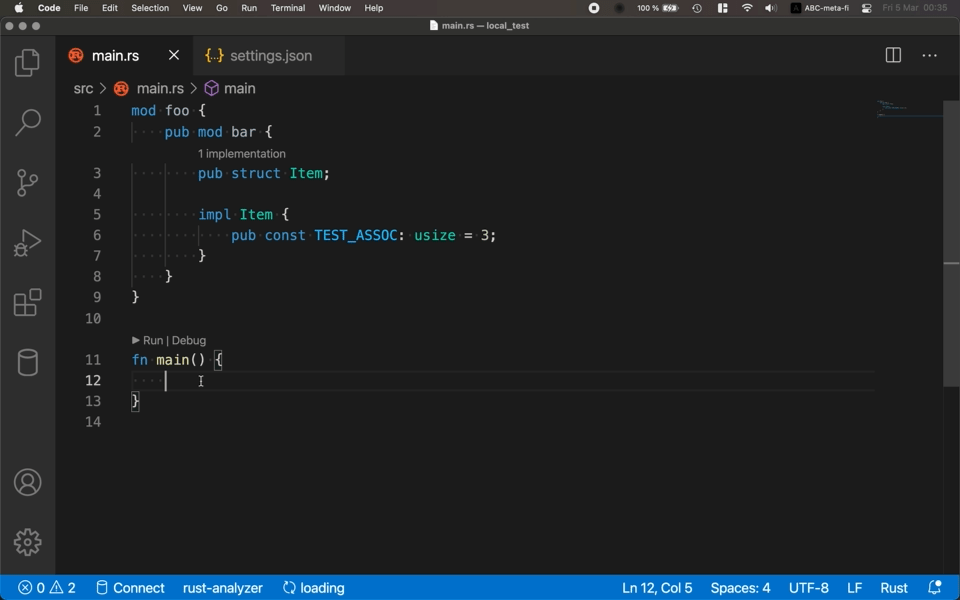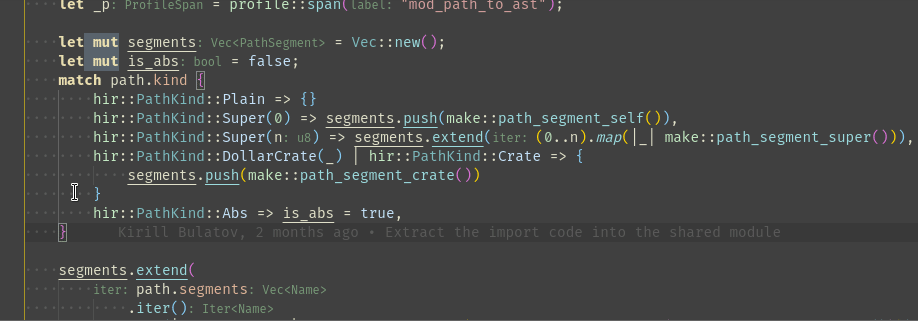There's a tension between keeping a well-architectured minimal
orthogonal set of constructs, and providing convenience functions.
Relieve this pressure by introducing an dedicated module for
non-orthogonal shortcuts.
This is inspired by the django.shortcuts module which serves a similar
purpose architecturally.
8591: Remove SyntaxRewriter usage in insert_use in favor of mutable syntax trees r=matklad a=Veykril
Unfortunately changing `insert_use` to not use `SyntaxRewriter` creates a lot of changes since so much relies on that. But on the other hand this should be the biggest usage of `SyntaxRewriter` I believe.
8638: Remove SyntaxRewriter::from_fn r=Veykril a=Veykril
Co-authored-by: Lukas Wirth <lukastw97@gmail.com>
8524: Fix extract function with partial block selection r=matklad a=brandondong
**Reproduction:**
```rust
fn foo() {
let n = 1;
let mut v = $0n * n;$0
v += 1;
}
```
1. Select the snippet ($0) and use the "Extract into function" assist.
2. Extracted function is incorrect and does not compile:
```rust
fn foo() {
let n = 1;
let mut v = fun_name(n);
v += 1;
}
fn fun_name(n: i32) {}
```
3. Omitting the ending semicolon from the selection fixes the extracted function:
```rust
fn fun_name(n: i32) -> i32 {
n * n
}
```
**Cause:**
- When `extraction_target` uses a block extraction (semicolon case) instead of an expression extraction (no semicolon case), the user selection is directly used as the TextRange.
- However, the existing function extraction logic for blocks requires that the TextRange spans from start to end of complete statements to work correctly.
- For example:
```rust
fn foo() {
let m = 2;
let n = 1;
let mut v = m $0* n;
let mut w = 3;$0
v += 1;
w += 1;
}
```
produces
```rust
fn foo() {
let m = 2;
let n = 1;
let mut v = m let mut w = fun_name(n);
v += 1;
w += 1;
}
fn fun_name(n: i32) -> i32 {
let mut w = 3;
w
}
```
- The user selected TextRange is directly replaced by the function call which is now in the middle of another statement. The extracted function body only contains statements that were fully covered by the TextRange and so the `* n` code is deleted. The logic for calculating variable usage and outlived variables for the function parameters and return type respectively search within the TextRange and so do not include `m` or `v`.
**Fix:**
- Only extract full statements when using block extraction. If a user selected part of a statement, extract that full statement.
8527: Switch introduce_named_lifetime assist to use mutable syntax tree r=matklad a=iDawer
This extends `GenericParamsOwnerEdit` trait with `get_or_create_generic_param_list` method
Co-authored-by: Brandon <brandondong604@hotmail.com>
Co-authored-by: Dawer <7803845+iDawer@users.noreply.github.com>
7873: Consider unresolved qualifiers during flyimport r=matklad a=SomeoneToIgnore
Closes https://github.com/rust-analyzer/rust-analyzer/issues/7679
Takes unresolved qualifiers into account, providing better completions (or none, if the path is resolved or do not match).
Does not handle cases when both path qualifier and some trait has to be imported: there are many extra issues with those (such as overlapping imports, for instance) that will require large diffs to address.
Also does not do a fuzzy search on qualifier, that requires some adjustments in `import_map` for better queries and changes to the default replace range which also seems relatively big to include here.

7933: Improve compilation speed r=matklad a=matklad
bors r+
🤖
Co-authored-by: Kirill Bulatov <mail4score@gmail.com>
Co-authored-by: Aleksey Kladov <aleksey.kladov@gmail.com>
7687: Specialization for async traits r=matklad a=arnaudgolfouse
Fixes#7669.
Adapting the parser seemed to be all that was needed, but I am not very experienced with the codebase. Is this enough ?
Co-authored-by: Arnaud <arnaud.golfouse@laposte.net>
7620: Support control flow in `extract_function` assist r=matklad a=cpud36
Support `return`ing from outer function, `break`ing and `continue`ing outer loops when extracting function.
# Example
Transforms
```rust
fn foo() -> i32 {
let items = [1,2,3];
let mut sum = 0;
for &item in items {
<|>if item == 42 {
break;
}<|>
sum += item;
}
sum
}
```
Into
```rust
fn foo() -> i32 {
let items = [1,2,3];
let mut sum = 0;
for &item in items {
if fun_name(item) {
break;
}
sum += item;
}
sum
}
fn fun_name(item: i32) -> bool {
if item == 42 {
return true;
}
false
}
```

# Features
Supported variants
- break and function does not return => uses `bool` and plain if
- break and function does return => uses `Option<T>` and matches on it
- break with value and function does not return => uses `Option<T>` and if let
- break with value and function does return => uses `Result<T, U>` and matches on t
- same for `return` and `continue`(but we can't continue with value)
Assist does handle nested loops and nested items(like functions, modules, impls)
Try `expr?` operator is allowed together with `return Err(_)` and `return None`.
`return expr` is not allowed.
# Not supported
## Mixing `return` with `break` or `continue`
If we have e.g. a `return` and a `break` in the selected code, it is unclear what the produced code should look like.
We can try `Result<T, Option<U>>` or something like that, but it isn't idiomatic, nor it is established. Otherwise, implementation
is relatively simple.
## `break` with label
Not sure how to handle different labels for multiple `break`s.
[edit] implemented try `expr?`
Co-authored-by: Vladyslav Katasonov <cpud47@gmail.com>
7535: Extract function assist r=cpud36 a=cpud36
This PR adds `extract function/method` assist. closes#5409.
# Supported features
Assist should support extracting from expressions(`1`, `2 + 2`, `loop { }`) and from a series of statements, e.g.:
```rust
foo();
$0bar();
baz();$0
quix();
```
Assist also supports extracting parameters, like:
```rust
fn foo() -> i32 {
let n = 1;
$0n + 1$0
}
// -
fn foo() -> i32 {
let n = 1;
fun_name(n)
}
fn fun_name(n: i32) -> i32 {
n + 1
}
```
Extracting methods also generally works.
Assist allows referencing outer variables, both mutably and immutably, and handles handles access to variables local to extracted function:
```rust
fn foo() {
let mut n = 1;
let mut m = 2;
let mut moved_v = Vec::new();
let mut ref_mut_v = Vec::new();
$0
n += 1;
let k = 1;
moved_v.push(n);
let r = &mut m;
ref_mut_v.push(*r);
let h = 3;
$0
n = ref_mut_v.len() + k;
n -= h + m;
}
// -
fn foo() {
let mut n = 1;
let mut m = 2;
let mut moved_v = Vec::new();
let mut ref_mut_v = Vec::new();
let (k, h) = fun_name(&mut n, moved_v, &mut m, &mut ref_mut_v);
n = ref_mut_v.len() + k;
n -= h + m;
}
fn fun_name(n: &mut i32, mut moved_v: Vec<i32>, m: &mut i32, ref_mut_v: &mut Vec<i32>) -> (i32, i32) {
*n += 1;
let k = 1;
moved_v.push(*n);
let r = m;
ref_mut_v.push(*r);
let h = 3;
(k, h)
}
```
So we handle both input and output paramters
# Showcase




# Working with non-`Copy` types
Consider the following example:
```rust
fn foo() {
let v = Vec::new();
$0
let n = v.len();
$0
let is_empty = v.is_empty();
}
```
`v` must be a parameter to extracted function.
The question is, what type should it have.
It could be `v: Vec<i32>`, or `v: &Vec<i32>`.
The former is incorrect for `Vec<i32>`, but the later is silly for `i32`.
To resolve this we need to know if the type implements `Copy` trait.
I didn't find any api available from assists to query this.
`hir_ty::method_resolution::implements` seems relevant, but is isn't publicly re-exported from `hir`.
# Star(`*`) token and pointer dereference
If I understand correctly, in order to create expression like `*p`, one should use `ast::make::expr_prefix(T![*], ...)`, which
in turn calls `token(T![*])`.
`token` does not have star in `tokens::SOURCE_FILE`, so this panics.
I had to add `*` to `SOURCE_FILE` to make it work.
Correct me if this is not intended way to do this.
# Lowering access `value -> mut ref -> shared ref`
Consider the following example:
```rust
fn foo() {
let v = Vec::new();
$0 let n = v.len(); $0
}
```
`v` is not used after extracted function body, so both `v: &Vec<i32>` and `v: Vec<i32>` would work.
Currently the later would be chosen.
We can however check the body of extracted function and conclude that `v: &Vec<i32>` is sufficient.
Using `v: &Vec<i32>`(that is a minimal required access level) might be a better default.
I am unsure.
# Cleanup
The assist seems to be reasonably handling most of common cases.
If there are no concerns with code it produces(i.e. with test cases), I will start cleaning up
[edit]
added showcase
Co-authored-by: Vladyslav Katasonov <cpud47@gmail.com>
7291: Wrap remaining self/super/crate in Name{Ref} r=matklad a=Veykril
That should be the remaining special casing for `self` 🎉
Co-authored-by: Lukas Wirth <lukastw97@gmail.com>
7218: Fix typos r=Veykril a=regexident
Apart from the very last commit on this PR (which fixes a public type's name) all changes are non-breaking.
Co-authored-by: Vincent Esche <regexident@gmail.com>
6587: SSR: Support statement matching and replacing r=davidlattimore a=MarijnS95
For #3186
Hi!
This is a smaller initial patchset that came up while working on support for statement lists (and my first time working on RA 😁). It has me stuck on trailing semicolons for which I hope to receive some feedback. Matching (and replacing) `let` bindings with a trailing semicolon works fine, but trying to omit these (to make patterns more ergonomic) turns out more complex than expected.
The "optional trailing semicolon solution" implemented in this PR is ugly because `Matcher::attempt_match_token` should only consume a trailing `;` when parsing `let` bindings to prevent other code from breaking. That at the same time has a nasty side-effect of `;` ending up in the matched code: any replacements on that should include the trailing semicolon as well even if it was not in the pattern. A better example is in the tests:
3ae1649c24/crates/ssr/src/tests.rs (L178-L184)
The end result to achieve is (I guess) allowing replacement of let bindings without trailing semicolon like `let x = $a ==>> let x = 1` (but including them on both sides is still fine), and should make replacement in a macro call (where `foo!(let a = 2;)` for a `$x:stmt` is invalid syntax) possible as well. That should allow to enable/fix these tests:
3ae1649c24/crates/ssr/src/tests.rs (L201-L214)
A possible MVP of this PR might be to drop this optional `;' handling entirely and only allow an SSR pattern/template with semicolons on either side.
Co-authored-by: Marijn Suijten <marijn@traverseresearch.nl>